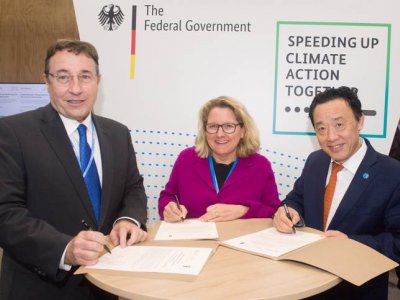UNDP and FAO partner on agriculture and land-use planning to support developing countries in accelerating ambition of climate actions

€20 million programme funded by Germany will boost agriculture sectors’ role in addressing climate change impacts and reaching targets for low-carbon climate-resilient development
Madrid, Spain, 11 December 2019 – The Government of Germany announced a €20 million trust fund for a joint collaboration between the United Nations Development Programme (UNDP) and Food and Agriculture Organization of the United Nations (FAO) that will support developing countries in building more effective agriculture and land-use plans to accelerate the ambition of Nationally Determined Contributions (NDCs) to the Paris Agreement.
The German Federal Ministry for the Environment, Nature Conservation, and Nuclear Safety (BMU), through its International Climate Initiative (IKI) will fund the five-year (2020-2025) joint collaboration on “Scaling up Ambition on Land Use and Agriculture through Nationally Determined Contributions (NDCs) and National Adaptation Plans (NAPs) Implementation.”
Rising sea levels, droughts, floods, increasing temperatures, changing rainfall patterns and other climate change impacts are projected to drive an additional 100 million people into poverty within the next decade and to displace 200 million people if countries fail to accelerate the ambition of their NDCs.
Transforming the agriculture sector will be essential in protecting vulnerable people from these impacts, reducing greenhouse gas emissions, building climate resilient livelihoods, and ending hunger and poverty to achieve the targets outlined in the Paris Agreement and Sustainable Development Goals.
Federal Environment Minister Svenja Schulze commented: “Too little attention has been paid to land use and agriculture in international discussions on climate until now, despite the fact that soil is the largest carbon sink on the planet after the oceans. Soil holds more carbon dioxide than all forests and the atmosphere combined. Overexploitation and erosion, however, release large amounts of CO2 from soil. In addition, adaptation to climate change is confronting agriculture with ever-greater challenges, especially in developing countries, where especially high priority is attached to food security and farming incomes. But agriculture is also a major greenhouse gas emission source. These are issues that we want to tackle together with our partner countries.”
Germany is an important and trusted partner for UNDP and FAO, and its contributions support a wide range of programmes around the world on designing and implementing NDCs. With the support from Germany, the programme will serve as a ‘facility’ for governments of 10 to 12 developing countries and provide technical support both on adaptation and mitigation in the agriculture sector to enhance NDC ambitions by 2025.
“This strategic programme will assist developing countries with planning and budgeting the much-needed shift to more sustainable land-use and agriculture practices – while helping vulnerable communities to better cope with the impacts of climate change,” said UNDP Administrator, Achim Steiner. “And this exciting partnership with FAO will feed into UNDP’s Climate Promise which is supporting 100 countries to submit enhanced NDCs by 2020.”
FAO and UNDP will work closely together to implement the initiative, and support and serve countries based on their comparative advantage.
FAO Director-General QU Dongyu, said: "An innovative approach to agriculture and land use is essential if we are to confront the current climate emergency and deliver on the goals of the Paris Agreement.
"This generous funding from the German government will support FAO and UNDP in their work with developing countries and help create initiatives in agriculture and land use for the achievement of the UN Sustainable Development Goals."
The new programme will mobilize strategic links and alliances between governments and the private sector, financial institutions and research organizations to upscale climate action on agriculture and land use. Together, FAO and UNDP will provide technical support to governments on resilient value chains, nature-based solutions and landscape assessments, and assist in integrating agriculture-related NDC-priorities in their agricultural planning and investments.
The strong and trusted partnership between UNDP and FAO has been nurtured, since 2015, when the two agencies began laying the foundation for adaptation planning in agriculture sectors with 11 countries across Asia, Africa and Latin America. Over the past five years, the joint “Integrating Agriculture in National Adaptation Plans Programme” (NAP-Ag) has enhanced the capacities of around 2,000 national and sectoral decision-makers representing over 90 institutions. Since 2008, UNDP has supported 75 countries in building their National Adaptation Plans.
View original on UNDP.org
View FAO Press Release
###
About UNDP
UNDP partners with people at all levels of society to help build nations that can withstand crisis, and drive and sustain the kind of growth that improves the quality of life for everyone. On the ground in nearly 170 countries and territories, we offer global perspective and local insight to help empower lives and build resilient nations.
About FAO
The Food and Agriculture Organization (FAO) is a specialized agency of the United Nations that leads international efforts to defeat hunger. Our goal is to achieve food security for all and make sure that people have regular access to enough high-quality food to lead active, healthy lives. With over 194 member states, FAO works in over 130 countries worldwide. We believe that everyone can play a part in ending hunger.
About BMU and IKI
Since 2008, the International Climate Initiative (IKI) of the Federal Ministry for the Environment, Nature Conservation and Nuclear Safety (BMU) has been financing climate and biodiversity projects in developing and newly industrializing countries, as well as in countries in transition. In the early years of the programme, its financial resources came from the proceeds of auctioning allowances under the emissions trading scheme. To ensure financial continuity, further funds were made available through the Special Energy and Climate Fund. Both funding mechanisms are now part of the Federal Environment Ministry’s regular budget.